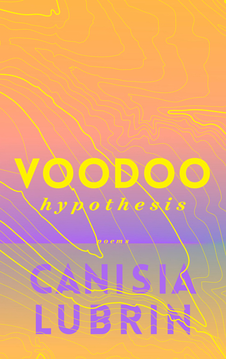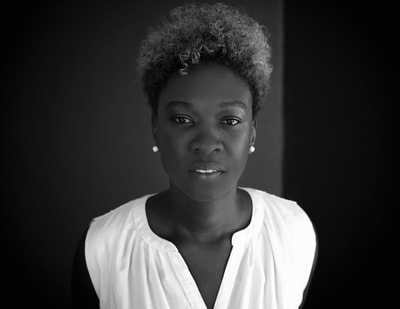CANISIA LUBRIN
The Rusty Toque | Issue 13 | Poetry | November 30, 2017
Final Prayer in the Cathedral of the Immaculate Conception IWho sought the theatrics: Who begged diagnosis get us off the hook, keep us in the rhapsody, and what force infests the night out of cad ventriloquy, the inimical boyhood that taunts us, the symmetry of shattered-strong women, even still the ones with tattoos of swallows growing up on the small of their backs could all look loved in the right light, the painted light mything your glass windows. What else is worse than nuclear fallout that I do not fear? Tell me there is nothing mad in my foreign-smelling black and I will mouth the dusk as it canopies this sanctimonious debris anatomized in the mirror. Tell me and I may sign myself with your cross. When without ever coming back to fix these battered wombs, already forgotten or only glandular to what has been I bargain for remnants of dreams like shards of ice in the eye. There is no need for ancient landscapes, no penance here through televangelists, no grassquit slipping these vines to wine. Peel back the scales of these untranslatable African songs, reveal them more syllabled than your “Gloria.” And see the black-toothed Homo habilis you’d expect. See queens and knights left over to check- mate. What is harder to deal with than an island nowhere with its catalytic lack of witness? The annulled reek of bodies clustered for decades to keep from killing most things? No one ever came to my door in searching – for you, no one, except for you – Final Prayer in the Cathedral of the Immaculate Conception IIIn the end we’d settle on paraphrase Tongues prostrate, still, like sages after a lifetime of silence With our names abandoned in the weight of our diviners Our serial practise of voice the unthinking deep within us, crescendos through space ornaments in place of moon and air everywhere, coming like a dawn, withheld bursting, we descend with the countdown of our rebirth with the return of early spring birds littering the sky, we water, hunting ourselves through a rare falling – are prepared to know our defence, keeping it locked when we have no use for it how, at first, coming home to crayon’d walls, strokes of pure spirit and bone of the ones who drew them, now absent, makes us mad. What we ought to have heard in the warring voices fleeing the night as we carried on our fleeting fall – was the half-rumoured lilt of thunder in the baby’s cry demanding plot and reasons bigger than the guns that stole us into a twilight we struggle to understand. – Ancient sages might have spoken that same hyperkiller language of dilating cervixes: Labour is the early war, the one less feared whose vaporous monotones of sorrow disappear too soon And mothers – already overburdened by the fallout taxes of some distant relative’s original sin, in which free will was enacted and land was spared and bestowed by a God wise enough to keep distance between earth and sky – ask: who’s duty now it is to shed the need for things to come to blow? That baldheaded anomaly in the vulva’s hoist packing up its mallets, beating its sandals one-handed, breaking tears as it enters the world whose flaking skin is the utopist shade of the galaxy… And who cares for these fables that console but not enough when the room half full of cobaltous children when the age of the singing bowl when the puppetry, fugues of string and votive, withhold warmth only long enough for us to clock our times and return home. To the bad seeds who’ve sucked up nicknames like bandit and colt and cockman, germinated from their toddling days in company of small hulks and rubber giraffes like secrets packed away in the attic These are the children we tell bedtime stories of our undying love of the silhouettes. So while we go on and limit sorrow to money and arms, that knock-of-the-sill and conscience, blanking the source of our ebbing genealogies, our anthologized dead still touch everything, numbering the stars and known universe as we find ourselves still prostrate beneath a sun still raging, before any of us even break into the work of our absence in the memorial, we have been conquered, fingers still jagged from battle, and we go on and we age into nocturne. |
These poems are excerpted from Canisia Lubrin's book Voodoo Hypothesis (Wolsak & Wynn):

Voodoo Hypothesis
by Canisia Lubrin
Wolsak & Wynn
October 2017
Description from the Publisher:
Voodoo Hypothesis is a subversion of the imperial construct of "blackness" and a rejection of the contemporary and historical systems that paint black people as inferior, through constant parallel representations of "evil" and "savagery." Pulling from pop culture, science, pseudo-science and contemporary news stories about race, Lubrin asks: What happens if the systems of belief that give science, religion and culture their importance were actually applied to the contemporary "black experience"? With its irreverence toward colonialism, and the related obsession with post-colonialism and anti-colonialism, and her wide-ranging lines, deftly touched with an intermingling of Caribbean Creole, English patois and baroque language, Lubrin has created a book that holds up a torch to the narratives of the ruling class, and shows us the restorative possibilities that exist in language itself.
CANISIA LUBRIN is a writer who has published poetry, fiction, non-fiction and criticism in Arc Poetry Magazine, Room Magazine, The Puritan, The Globe & Mail and others. She serves on the editorial board of the Humber Literary Review and as an advisor to Open Book Ontario. Lubrin holds an MFA from the University of Guelph-Humber and teaches English at Humber College. She was born in St. Lucia and lives in Whitby, Ontario.


